Key Takeaways
What is a mortgage commitment letter? |How to get a mortgage commitment letter |Mortgage commitment process | Types of commitment letters | Mortgage commitment letter sample |
Mortgage commitment letter FAQs
Before you buy a new house, you need to know how much financing you qualify for. This lets you know which homes are in your price range and which ones exceed your budget. Not only that, but you’ll want to show prospective sellers that you’re a legitimate buyer.
A mortgage commitment letter is a powerful tool for meeting both of these goals. Here’s how it works.
What Is A Mortgage Commitment Letter?
A mortgage commitment letter – sometimes called a mortgage approval letter – is an official letter from a lender to a homebuyer stating the financing and terms that have been agreed upon for the loan.
Obtaining this letter is important because it guarantees to the seller that you have been approved for financing. They know they don’t have to worry that you’ll get denied a mortgage, or that anything will go wrong during the underwriting process.
[ Thinking about investing in real estate? Register to attend a FREE online real estate class and learn how to get started investing in real estate. ]

How To Get A Mortgage Commitment Letter
Getting a mortgage commitment letter requires you to get preapproved by your lender. This will typically require you to provide proof of income, such as your pay stubs or bank statements. You’ll also need to undergo a credit check, which will include your score and any recent defaults.
After considering all of these factors, the lender will determine how much financing you qualify for. They may also set different interest rates depending on your credit history and the loan amount.
Mortgage Commitment Process
As you work towards getting a mortgage, you progress through different levels of approval. Here’s a rough outline of the process.
1. Prequalification
Prequalification comes at the very beginning of the approval process. If you’re on top of your paperwork, you can even get prequalified before you find a home. This can be a useful tool in the home buying process since you’ll have a ballpark idea of your price range.
To get prequalified, you’ll have to give your lender some information. This typically includes your income, existing debts, and significant assets. The lender will also conduct a credit check. Some lenders will only conduct a soft check at this point, though, which won’t affect your credit. If you’re concerned about this, ask before you apply.
The good news is that prequalification is quick and painless. It takes less than a day, and it’s usually free.
2. Preapproval
The next step towards getting your mortgage is getting preapproved. This is a more serious approval, where you’ll have to submit more information. You’ll have to fill out the actual mortgage application, turn over your bank payments and pay stubs, and prove the value of any major assets. If you didn’t get a hard credit check during prequalification, that would also happen at this point.
Preapproval doesn’t come with any specific terms. It does, however, prove to prospective sellers that you can afford to buy their home.
3. Mortgage Commitment Letter
Upon preapproval, your lender will send you a conditional mortgage commitment letter. But as its name implies, this is just a conditional letter. To get fully approved, you’ll still have to go through some additional steps. The exact steps will vary depending on your lender, as well as state law, but here are some of the conditions that are likely to be required:
-
Proof of title
-
Proof of homeowner’s insurance
-
Submission of other documents
-
Completion of a purchase agreement
In addition, you must have the ability to pay the down payment and closing costs. Your credit must also go largely unchanged. If you defaulted on your credit card after preapproval, you might not get a mortgage commitment letter.
A home appraisal is another crucial part of the process. Simply put, no lender is willing to lend more for a house than it’s worth. If you were to default, how would they get their money back? This can affect the amount of loan you’re qualified for. For example, you may have been preapproved for a $200,000 loan, but the home’s appraised value is only $175,000. In that case, the bank would only offer you a loan of $175,000.
Once these steps have been completed, along with a routine title check, you’ll receive your mortgage commitment letter.
What’s Included In A Mortgage Commitment Letter?
A mortgage commitment letter includes the amount being borrowed, the interest rate, and the length of the loan. There will also be conditions attached, such as the requirement to carry homeowner’s insurance. A lender can still deny a loan at closing if these conditions have not been met.
Types Of Mortgage Commitment Letters
There are two different types of mortgage commitment letters: conditional and final. Here’s a quick overview of the two.
Conditional Commitment
The most common type of mortgage commitment letter is conditional. This means that the lender promises to provide funding, provided that the borrower meets specific conditions before the commitment expires. These conditions vary, but can include:
-
The house must pass a home inspection
-
The buyer must have proof of homeowner’s insurance
-
The buyer must demonstrate that they have funding for the down payment
-
The buyer’s credit score and income cannot change
-
The buyer may have to provide more documents
Final Commitment
A final mortgage commitment letter is what you get after you’ve met all the conditions of a conditional letter. In addition to the loan amount, you’ll also see other detailed loan information, including:
-
The loan term
-
The interest rate
-
The expiration date
-
The type of loan (fixed or variable)
-
The name of the borrower and the lender
Mortgage Commitment Letter Sample
Different lenders will use different wording for their mortgage commitment letters, but they all provide the same basic information. Here’s an example:
Lender: Main Street Bank Borrower: John and Jane Doe Date: 11-21-2022
1000 Main Street 1529 Oak Street Loan Number: 52343
Duluth, MN 55807 Detroit, MI 48226
Property Address: 4321 First Street, Duluth, MN 55807
Main Street Bank is happy to inform you that your mortgage loan application has been approved. This approval is subject to the following conditions:
Product: Fixed Rate Mortgage
Loan Amount: $200,000
Loan Term: 360 months
Loan Type: Conventional
Loan Purpose: Purchase
Interest Rate: 4.25%
Origination Charges: $1,200
This mortgage is to be repaid in 360 monthly installments of $984, including principal and interest. Prior to funding, an escrow fund is required for payment of insurance and property taxes. The required escrow payment for the first 12 months is $350. There is no prepayment penalty for this mortgage.
This offer will expire on 12-21-2022. Your loan must close prior to midnight on this date.
Each person signing this commitment letter fully understands its contents and acknowledges that they have read and received it.

Mortgage Commitment Letter FAQs
So, what else do you need to know about mortgage commitment letters? Here are a few common questions we haven’t addressed yet.
Why Is Having A Mortgage Commitment Letter Important?
Having a mortgage commitment letter demonstrates to the buyer that you have completed the application process and qualified for the mortgage. Since they don’t have to worry about you backing out for purely financial reasons, they’ll be more likely to move forward with a sale.
How Long Does it Take to Get a Mortgage Commitment Letter?
It depends on how long your bank takes to process your documentation. Typically, this takes between three to six weeks. Make sure you submit all the required documents when you send in your application. If your bank has to ask you for more info, the process will take longer.
What If The Mortgage Commitment Letter Expires?
If your commitment letter expires before you close, you’ll have to reapply for your loan. This can change the amount you’re approved for, including the interest rate.
If The Lender Agrees To A Certain Amount, Can I Spend That Much On A House?
It all depends on your budget. Keep in mind that there are additional costs, such as the down payment and closing costs, which are a percentage of the purchase price. The higher the purchase price, the higher these costs will be.
It’s also important to think about the other costs that go into your home. You’ll have to pay for insurance, property taxes, and maintenance, which can include major repairs. Just because you can afford the mortgage doesn’t mean you can afford the home. Make sure to take all these factors into account before you sign on the dotted line.
What If I Don’t Want A Seller To Know My Preapproval Amount?
Lenders are willing to provide special commitment letters for a lower dollar amount. Ask them to provide one for the amount you’re actually willing to pay.
What Happens After Receiving Your Mortgage Commitment Letter?
Provided you’re able to meet all the conditions, you close on your home. Keep in mind that the seller may have additional conditions, or there may be other disagreements. A mortgage commitment letter is just a promise from the bank that they will finance your mortgage if you meet their commitments.
Summary
Getting a mortgage commitment letter is an essential step towards moving into your new home. Thankfully, it’s not complicated to get, as long as you meet your lender’s credit requirements. Once you’ve been approved, you’ll be one step closer to closing on the house of your dreams. Refer to our example so you can know what to expect in your commitment letter.
Ready to start taking advantage of the current opportunities in the real estate market?
Click the banner below to take a 90-minute online training class and get started learning how to invest in today’s real estate market!


